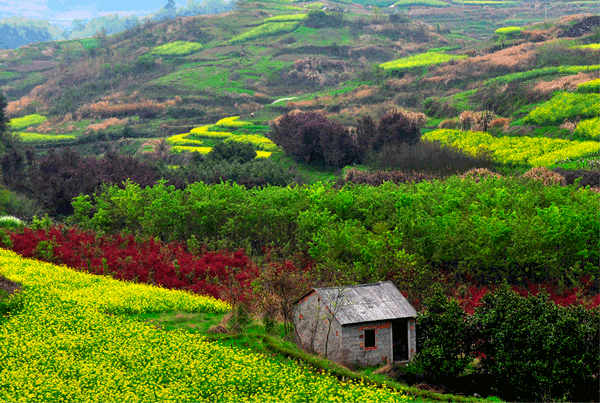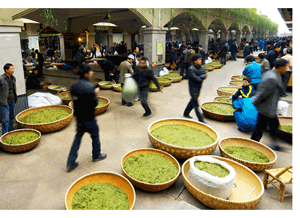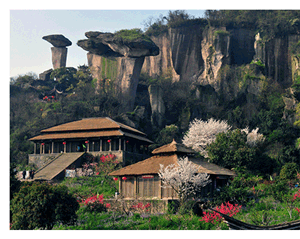
Wild Wild Tea
A Fabulous Journey to Find Highland Wild Tea.
 |
I wanted to go on an adventure during the most brilliant period of spring, as the plum trees are just about to flower. Peach blossoms begin to show their beauty, and fragrant flowers are in boundless bloom everywhere in the countryside. After some thought, I chose Xinchang county, located in the east of Zhejiang province, southeast of Shaoxing city.
Photos and Written by Wang Yuanchang
It is a mountainous location with Tianlao Mountain in the east, Kuaiji Mountain in the north, and with Wozhou Lake flowing through, allowing expansive tea growing areas to flourish among the multiple rivers. Few people know that its’ Dafo or Buddha Longjing tea is the best Longjing tea in the world and is exported to more than 10 countries. On the way to Xinchang, I begin to feel excited about the upcoming journey to the highland wild tea region.
Tea in the Mist
The tea plantations extend along Kuaiji and Tianlao Mountains with thick forests, gigantic trees, gushing waters and deep valleys. Hiking and climbing trails are narrow and steep, zigzagging upwards. In the far distance, the green trees and tea plantation is visible, gleaming in the mist.
The tea plantations captivated me at first sight. I personally love the green tea plantation in the Tianlao Mountain, where I saw acres upon acres of plantations nestled in the clouds. It is said Tianlao Mountain is greatly admired and worshiped by historical and cultural figures. In my opinion, no matter who you are, if you immerse yourself in the tea garden, you will lose yourself in the magic scenery and grand atmosphere.
As a tea specialist says, tea is a kind of plant that has spirituality, choosing to live in fertile, tranquil, pure and good Feng-Shui places. Therefore, the best tea grows in mountainous areas. Abundant water resources are another necessity to guarantee good tea. Such is the case in Xinchang. With the perfect combination of climate, soil in high mountains and rich water resources, those teas processed by traditional techniques with little external influence, are gifts from nature. After more than 1,000 years of harmonization between the area’s culture and tea culture in Xinchang high mountain areas, there still exists the Buddha Longjing Tea, growing without application of any pesticide or growth stimulant.
 Encountering Waipokeng Villagers
Encountering Waipokeng Villagers
When walking into the tea plantation I was surprised by the vast expanse, which reaches to the horizon. In the dense tea plantation huge numbers of tea harvesters create a wondrous picture.
This giant operation began with the small Waipokeng village hidden 850 meters above sea level in the mountains, on the headstream of the Chengtan River. There are only about 158 families living there whose livelihood is harvesting tea. Locals still maintain a simple, rustic agricultural lifestyle, with vegetables, paddies, and fruits – and of course, tea – being their main source of income.
I climbed along the steep track, past verdant hills and rolling mountains, and can clearly feel the changes of temperature and humidity. On the mountainside I met an old woman carrying a bundle of sticks. She said she was 88 years old, has a son and daughters, who all live and work in the city, with a granddaughter left to be taken care of by her. This is typical of village life with most adults and young men leaving to find work and the children, the elderly and women are left to live by planting tea. For generations they have lived a life isolated from the outside world and known by few people.
“But where or how do you sell your tea?” I asked, surprised. “There are regular market days in Xinchang every month; we carry tea to the market and businessmen come there to select the tea. Many foreigners come to buy tea,” she answered. All along the way we met several old men and women, who all looked strong and moved quickly.
“How can you keep so strong at your age?” I asked.
“Don’t you know our Waipokeng Village is one of the most famous villages for longevity in China? We have an average life span of 90 years. For generations, no one died young or even middle aged.” As we climbed, I was a little out of breath. I offered to help her carry the bundle but she refused and said with a smile, “This bunch of sticks is just a piece of cake for me. My daughters-in-law and I plant in the tea field every day.”
Entering the Local Village
Approaching the village, scattered wooden houses came into my eyes. While I was curious about the ancient houses, the old woman invited me to her home to drink some tea. A little girl wearing a beautiful ethnic dress sat in the courtyard, enjoying her tea. She must have noticed me staring at her clothes and told me it was the traditional dress of the Miao people. To my surprise, this small village has 11 minorities, such as Bai, Miao, Dai nationalities, etc. and enjoys the reputation of “First Minority in Jiangnan”.
The girl brought me a cup of tea and some tea cakes. All of sudden I could smell aromatic tea fragrance. The tea leaves rolling in the golden tea water appeared a slight and tempting green and slowly sank to the bottom of the glass.
I tried a little sip. The velvety liquid had a crisp and mellow taste and a sweet aftertaste lingering in my mouth.
“I like this tea,” I told them. The old woman smiled and spoke, “This tea is completely wild. In the mountains there is an area of plantations where wild tea has grown for hundreds of years. It is 100 percent pure and unpolluted, and mostly it is kept for our own villagers, and rarely seen in the tea market. The most important point is that the water is from a spring, which is best for brewing tea.” In her home, we also witnessed the growers’ tea making process. Not mechanized, everything is still done by hand, such as the sorting of leaves for drying. The leaves are placed in the centre of a large bamboo tray. Grabbing the tray with both hands, the growers use a “throw, turn, shake and lift” motion to spread the leaves out evenly. The leaves are then tossed, giving off different aromas as they dry.
We left the village the next day at dawn when the mountains were still covered by clouds. Sitting in the boat, with the refreshing early spring breeze on my face, I looked back at the clear water, flourishing tea mountains, blue sky and white clouds and wished this quiet journey, free from the day-to-day worries of the city, could have lasted longer.